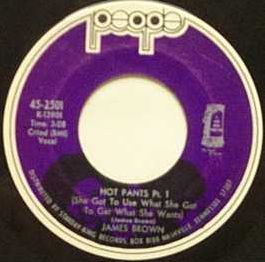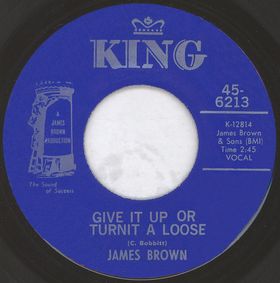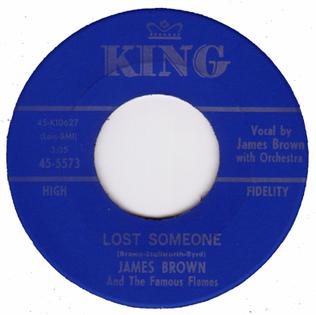Related Research Articles

"Funky Drummer" is a single released by James Brown in 1970. Its drum break, improvised by Clyde Stubblefield, is one of the most frequently sampled music recordings.

"I Got You (I Feel Good)" is a song by American singer James Brown. First recorded for the album Out of Sight and then released in an alternate take as a single in 1965, it was his highest-charting song and is arguably his best-known recording. In 2013, the 1965 recording was inducted into the Grammy Hall of Fame.

"Say It Loud – I'm Black and I'm Proud" is a funk song performed by James Brown, and written with his bandleader Alfred "Pee Wee" Ellis in 1968. It was released as a two-part single which held the number-one spot on the R&B singles chart for six weeks, and peaked at number ten on the Billboard Hot 100. Both parts of the single were later included on James Brown's 1968 album A Soulful Christmas and on his 1969 album sharing the title of the song. The song became an unofficial anthem of the Black Power movement.

"Papa's Got a Brand New Bag" is a song written and recorded by James Brown. Released as a two-part single in 1965, it was Brown's first song to reach the Billboard Hot 100 Top Ten, peaking at number eight, and was a number-one R&B hit, topping the charts for eight weeks. It won Brown his first Grammy Award, for Best Rhythm & Blues Recording.

The Payback is the 37th studio album by American musician James Brown. The album was released in December 1973, by Polydor Records. It was originally scheduled to become the soundtrack for the blaxploitation film Hell Up in Harlem, but was rejected by the film's producers, who dismissed it as "the same old James Brown stuff." A widely repeated story—including by Brown himself—that director Larry Cohen rejected the music as "not funky enough" is denied by Cohen. On the DVD commentary track for Black Caesar, Cohen states that executives at American International Pictures were already unhappy with Brown for delivering songs much longer than expected on Black Caesar and Slaughter's Big Rip-Off and opted for a deal with Motown Records instead. Cohen said the absence of Brown's music from Harlem still "breaks [his] heart."
"Soul Power" is a song by James Brown. Brown recorded it with the original J.B.'s and it was released as a three-part single in 1971. Like "Get Up Sex Machine" and other hits from this period it features backing vocals by Bobby Byrd. It charted #3 R&B and #29 Pop.
"Cold Sweat" is a song performed by James Brown and written with his bandleader Alfred "Pee Wee" Ellis. Brown recorded it in May 1967. An edited version of "Cold Sweat" released as a two-part single on King Records was a No. 1 R&B hit, and reached number seven on the Pop Singles chart. The complete recording, more than seven minutes long, was included on an album of the same name.

"Mother Popcorn (You Got to Have a Mother for Me)" is a song recorded by James Brown and released as a two-part single in 1969. A #1 R&B and #11 Pop hit, it was the highest-charting of a series of recordings inspired by the popular dance the Popcorn which Brown made that year, including "The Popcorn", "Lowdown Popcorn", and "Let a Man Come In and Do the Popcorn". The "mother" of the song's title was, in the words of biographer RJ Smith, "[Brown's] honorific for a big butt".

"The Payback" is a funk song by James Brown, the title track from his 1973 album of the same name. The song's lyrics, originally written by trombonist and bandleader Fred Wesley but heavily revised by Brown himself soon before it was recorded, concern the revenge he plans to take against a man who betrayed him. The song is notable for its sparse, open arrangement and its use of wah-wah guitar – a relative rarity in Brown's previous funk recordings. Released as a two-part single in February 1974, it was the first in an unbroken succession of three singles by Brown to reach #1 on the R&B charts that year – the last chart-toppers of his career. It also peaked at number 26 on the Billboard Hot 100. It was his second, and final, single to be certified gold by the RIAA.

"Hot Pants (She Got to Use What She Got to Get What She Wants)" is a 1971 song by American singer James Brown, released as a single on his People Records label (then distributed by King Records) in July of that year with "Pt. 1" on the A-side and "Pt. 2 and 3" on the B-side. It was a number-one hit on the Billboard R&B chart, and reached number fifteen on the Hot 100 and number ten on the Cashbox magazine charts. "Hot Pants" was Brown's final release under King's purview before he and the People label moved to Polydor Records.

"Get on the Good Foot" is a funk song performed by James Brown. It was released in 1972 as a two-part single that charted #1 R&B and #18 Pop. It also appeared on an album of the same name released that year. Partly due to the unwillingness of Brown's record labels to certify sales of his previous hits, "Get on the Good Foot" was his first gold record. Billboard ranked it as the No. 99 song for 1972.

"Give It Up or Turnit a Loose" is a funk song recorded by James Brown. Released as a single in 1969, the song was a #1 R&B hit and also made the top 20 pop singles chart. "Give It Up or Turnit a Loose" appeared as an instrumental on the Ain't It Funky (1970) album, removing Brown's vocals and adding guitar overdubs, while the vocal version was released on It's a New Day – Let a Man Come In (1970).
"Papa Don't Take No Mess" is a funk song performed by James Brown. An edited version of the song released as a two-part single in 1974 was Brown's 17th and final number one R&B hit and peaked at number thirty-one on the Hot 100. The full-length version, nearly 14 minutes long, appeared on the double album Hell.

"I Got the Feelin'" is a funk song by James Brown. Released as a single in 1968, it reached No. 1 on the R&B chart and #6 on the pop chart. It also appeared on a 1968 album of the same name.

"Doing It to Death", also known as "Gonna Have a Funky Good Time", is a funk song recorded by The J.B.'s featuring James Brown. A 10-minute, two-part version of "Doing It to Death" was included on a J.B.'s album of the same name. The complete, unedited and nearly 13-minute-long original recording of the song was first issued on the 1995 J.B.'s compilation Funky Good Time: The Anthology. Performances of the song also appear on the albums Live at Chastain Park and Live at the Apollo 1995.

"Lost Someone" is a song recorded by James Brown in 1961. It was written by Brown and Famous Flames members Bobby Byrd and Baby Lloyd Stallworth. Like "Please, Please, Please" before it, the song's lyrics combine a lament for lost love with a plea for forgiveness. The single was a #2 R&B hit and reached #48 on the pop chart. According to Brown, "Lost Someone" is based on the chord changes of the Conway Twitty song "It's Only Make Believe". Although Brown's vocal group, The Famous Flames did not actually sing on this tune, two of them, Bobby Byrd, and "Baby Lloyd " Stallworth, co-wrote it with Brown, and Byrd plays organ on the record, making it, in effect, a James Brown/Famous Flames recording.
"Licking Stick – Licking Stick" is a song written by James Brown, Bobby Byrd, and Alfred "Pee Wee" Ellis and recorded by Brown as a two-part single in 1968. Byrd provides backing vocals on the song. It was the first stereo single release by King Records. The song was included on the album Say It Loud – I'm Black and I'm Proud.
"My Thang" is a funk song written and recorded by James Brown. Unlike most of his songs, this song was released not as a two-part single, but instead issued with three different B-sides. It spent two weeks at number one on the R&B singles chart - Brown's second #1 in a row, following "The Payback" - and reached No. 29 on the Billboard Hot 100 in July 1974. The song also appeared on Brown's 1974 double album Hell.
"Maybe the Last Time" is a song written by James Brown and recorded by Brown and the Famous Flames in 1964. It was released as the B-side of "Out of Sight" and was also included on the Out of Sight album. Brown described it as "a heavy gospel-based number, all about appreciating friends and everything while you can because each time you see somebody may be the last time, you don't know." It was the last studio recording Brown made with the Famous Flames, although the singing group continued to perform live with him for several more years.
"Get It Together" is a song performed by James Brown. Released in October 1967 as a two-part single, it charted #11 R&B and #40 Pop. Both parts also appeared on the album I Can't Stand Myself When You Touch Me. Donald A. Guarisco of Allmusic described the song as "a taut, minimalist tune that combines soulful but frantically paced verse melodies with a bubbling, two-note staccato chorus."
References
- ↑ White, Cliff (1991). "Discography". In Star Time (pp. 54–59) [CD booklet]. New York: PolyGram Records.
- ↑ Palmer, Robert. "Out of the Brown Bag". Rolling Stone September 12, 1974. Rpt. in The James Brown Reader: Fifty Years of Writing About the Godfather of Soul. Ed. Nelson George and Alan Leeds. New York: Plume, 2008. 101-104.
- ↑ Leeds, Alan (1995). Hell [CD liner notes]. New York: PolyGram Records.